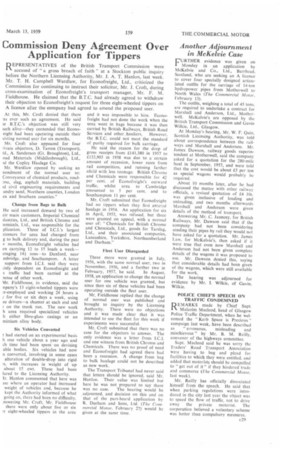Commission Deny Agreement Over Application for Tippers
Page 67

If you've noticed an error in this article please click here to report it so we can fix it.
REPRESENTATIVES of the British Transport Commission were accused of "a gross breach of faith at a Stockton public inquiry before the Northern Licensing Authority, Mr. J. A. T. Hanlon, last week. Mr. T. H. Campbell Wardlaw, for Econofreight, Ltd., criticized the Commission for continuing to instruct their solicitor, Mr. J. Croft, during cross-examination of Econofreight's transport manager, Mr. F. M. Ficidhouse. He claimed that the B.T.C. had already agreed to withdraw their objection to Econofreight's request for three eight-wheeled tippers on A licence after the company had agreed to amend the proposed user.
At this, Mr. Croft denied that there as ever such an agreement. He said ie B.T.C.'s objection was still very inch alive—they contended that Econoeight had been operating outside their tisting normal user for six months.
Mr. Croft also appeared for four rivate objectors, D. Tarren (Transport), Id., A. Sanderson (Gt. Broughton), Ltd., oad Materials (Middlesbrough), Ltd., id the Copley Haulage Co.
Mr. Wardlaw opened by seeking an nendmcnt of the normal user to: Conveyance of chemical products, roadane, slag, asphalt materials, building id civil engineering requirements and undry sand, Northern counties, London ea and Southern counties."
Change from Bags to Bulk
He said increased demand by two of eir main customers, Imperial Chemical dustries, Ltd., and British Chrome and iemicals, Ltd., was responsible for the plication. Three of I.C.I.'s largest stomers for urea had changed from
g to bulk delivery and, during the past months, Econofreight vehicles had en carrying 12 to 15 loads a weekeraging 144tons—to Duxford, near mbridgc, and Southampton. A letter support from I.C.I. said they were Linly dependent on Econofreight and
s traffic had been carried at the 3ense of other work.
Mr. Fieldhouse, in evidence, said the npany's 13 eight-wheeled tippers were n.-employed and working 24 hours a f for five or six days a week, using ee drivers—a shunter at each end and on the trunk run. The new work
h urea required specialized vehicles h either libre-glass casings or an minium alloy body.
Six Vehicles Converted t had started on an experimental basis h one vehicle about a year ago and ch time had been spent . on devising able bodies. Six vehicles had now n converted, involving in some cases alteration of double-drop into rigid is, with increases in weight of up about 15 cwt. These had been hired to the Licensing Authority.
Ir. Hanlon commented that here was Ise where an operator had increased weight of vehicles and, because he kept the Authority informed of what going on, there had been no difficulty. .nswering Mr. Croft, Mr. Fieldhouse there were only about five or six eight-wheeled tippers in the area and it was impossible to hire. Econofreight had not done the work when the urea went in bags because it was then carried by British Railways, British Road Services and other hauliers. However, the B.T.C. could not meet the standard of purity required for bulk carriage.
He said the reason for the drop of gross receipts from £141,380 in 1957 to £133,903 in 1958 was due to a certain amount of recession, lower rates from rail competition, and running farther afield with less tonnage. British Chrome and Chemicals were responsible for 42 per cent. of Econofreight's outward traffic, whilst urea to Cambridge amounted to 5 per cent, and to Southampton 11 per cent.
Mr. Croft submitted that Econofreight had no tippers when they first entered haulage in 1954. An application for six in April, 1955, was refused, but three were granted on appeal, with a normal user of: "Chemicals for British Chrome and Chemicals, Ltd., goods for Tarslag, Ltd., and their associated companies, Lancashire, Yorkshire, Northumberland and Durham."
Fleet User Disregarded Three more were granted in July, 1956, with the same normal user, two in November, 1956, and a further two in February, 1957, he said. In August, 1958, an application to change the normal user for one vehicle was granted, but since then six of these vehicles had been operating outside the fleet user.
Mr. Fieldhouse replied that the change of normal user was published and brought to inquiry by the Licensing Authority. There were no objections and it was made clear that it was intended to use the fleet for this work if experiments were successful.
Mr. Croft submitted that there was no case for the objectors to answer. The only evidence was a letter from I.C.I. and one witness from British Chrome and Chemicals. There was no proof of need and Econofreight had agreed there had been a recession. A change from bag to bulk haulage could not be described as new work, The Transport Tribunal had never said that letters should be ignored, said Mr. Hanlon. Their value was limited but here he was not prepared to say there
was no case. The hearing would be adjourned, and decision on this and on that of the part-heard application by R. Durham and Sons, Ltd. (The Commercial Motor, February 27) would be given at the same time.




















































































































































































